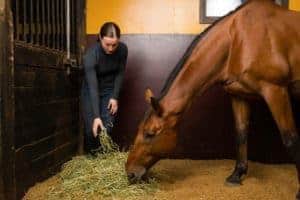Algae in Horse Water Troughs: Is It Safe?
- Posted by Clair Thunes, PhD

A: Algae in troughs is a common problem once temperatures start to rise. To grow, algae need water, sunlight, and a nutrient source. Nutrients can come from organic material that has blown into the trough, manure, or even your horse’s saliva.
While most algae don’t pose a direct health concern, certain types of blue-green algae release toxins that can lead to colic and diarrhea. Additionally, a lot of algae might make the water less desirable to your horse and lead to reduced water intake. Keeping algal blooms to a minimum in your troughs is therefore a smart idea. Here are some solutions:
1. Shade
Placing a shade structure over troughs can help reduce sun exposure, slowing algae growth. However, this obviously incurs a cost and might not work in all trough locations
Create a free account with TheHorse.com to view this content.
TheHorse.com is home to thousands of free articles about horse health care. In order to access some of our exclusive free content, you must be signed into TheHorse.com.
Start your free account today!
Already have an account?
and continue reading.

Written by:
Clair Thunes, PhD
Related Articles
Stay on top of the most recent Horse Health news with













7 Responses
Hi Cindy, will this work without the oregano? Approximately how much is a generous amount and how often do you add to water trough? I top off almost every day to help keep the water fresh.
Hi Maureen, can you be more specific on how you do this?
I make a tincture by stuffing a couple handfuls of fresh oregano I grow myself, into a gallon jug of vinegar, and add a generous splash to my horses’ 50 gallon water trough when I fill or top it off. my horses have learned to love the taste of vinegar because I also add organic raw cider vinegar to their supplements as a probiotic. the vinegar makes the water in the trough acidic enough to prevent most algae growth. also discourages ravens & other wild critters from drinking out of the trough. I’ve been doing this for years & my horses are very healthy, no colic ever.
Hi Maureen, I was wondering would the pool tabs work on a cement horse trough as well?
Also is it safe for the horses to drink?
What can I do to get rid of the algae in my horses cement trough permanently? I heard that baking soda sprinkled in the water will kill it and I also heard that baking soda willl clean it and after it’s cleaned to add a little bit more baking soda to keep the water fresh clean and clear of algae. Is this true?
I use swimming pool chlorine tabs to control the algae in my horse troughs. They release chlorine slowly and can be broken down into smaller pieces for smaller tubs. Be sure to get quality tabs, not like the ones Walmart or similar stores sell. I get mine from the people who service my pool. I use them year-round so the horses always have the same tasting water. A 70 pound pail of 3″ tabs lasts me a year or more and I have one big trough for my Belgian mare and 3 small tubs for my minis. I have been doing this for probably 20 years or more with no ill effects. Now if we could find something that would dissolve the dust in the water.LOL.
Maureen Arnold